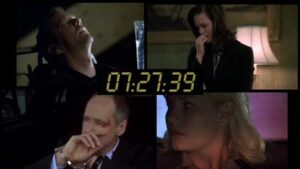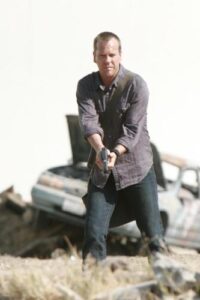In honor of what happens to be my 24th article for The Jewish Connection, it seems fitting to highlight the fascinating nature of the action drama television series “24,” where one season takes place in one day.
The series, which aired in the 2000s, follows fictional character Jack Bauer, a federal agent with time-sensitive, high stakes missions to defeat terrorists. I watched it on-demand a couple years ago, and within just a few episodes I was already captivated by the twists and turns, phenomenal acting, and brilliant screenwriting. But most compelling was the unique structure of the show.
24 episodes in a season. Each episode is one hour. It takes place in real time. When returning from commercial break a digital clock appears with a loud, intense ticking — so fitting considering how worrisome the passage of time is amidst the threats and crises the desperate protagonists face.

It is a very thought-provoking idea, packing a whole season into just 24 hours. Especially when considering today’s fast-paced news environment. In fact, the theme might be more reflective of real life than we initially realize. A lot of major events that are talked about for years, even decades and centuries to come occur within only a few moments. Yet they are immortalized in our collective conscience.
Consider the Titanic. Despite sinking in less than three hours, it remains one of the most studied and infamous disasters on our minds, even inspiring one of the greatest films of all time. The attack on Pearl Harbor, 9/11, and the assassination of President John F. Kennedy are also tragedies that, despite taking place within a short duration, have forever altered the course of history. More recently, the October 7 terrorist attack in Israel happened on a single day, and has sparked a months-long war and the risk of a wider conflict in the Middle East.
It is not only tragedies that significantly shift the direction of events. On Election Day we wake up not knowing for sure who will, in just a few hours, be elected the next president. On Super Bowl Sunday we can never be certain who will be victorious, until it is over. This might be a bit overdramatic, but on December 31, within just 24 hours we go from the end of one year to the beginning of another (the current year, as it happens, being ‘24).
There is Judaic significance to the concept of a single day as well. The Torah describes all that God creates on each day of the week. Shabbos, the holiest one, is one single day that is so valuable, indeed so central to the Jewish religion. Likewise, the deceased are ideally buried within one day of their passing.
According to The Times of Israel, Kiefer Sutherland, who plays 24’s main protagonist Jack Bauer, happens to have a few connections to Israel. He once told a British interviewer that “I have two cousins in Israel. One is a helicopter pilot and the other is a tank commander.” Bauer “may have some Israeli military toughness in his genes,” The Times of Israel quipped. Sutherland also noted his sister visited a kibbutz.
To be sure, 24 likely exaggerates how much can happen in such a short amount of time — discovering terrorist threats, navigating serious and complicated obstacles, and foiling plots all within one day. In an article for The New Yorker, Jane Mayer notes how the show “packs an improbable amount of intrigue into twenty-four hours.”

Sutherland told the Associated Press how “there’s a running joke among fans that Jack never goes to the bathroom.” In one discarded “joke reel,” Jack Bauer heads toward a sign which says “BATHROOM” in one direction and “OFFICES” the other. “I did a double-take and ran towards the bathroom!” Sutherland recalled.
Regardless of certain unrealistic elements however, the show may function as a reminder of the nature of time and change, which can often happen quite drastically and unexpectedly.
On top of its significance for someone who appreciates the format of the episodes, 24 also exemplified the politics of its time, including a broader mentalité that saw the problems of government bureaucracy and the value of taking matters into your own hands.
Derek Johnson, a professor of Media and Cultural Studies, examines in a journal article a broader phenomenon in the aftermath of 9/11 that affected both 24 and the war on terror, and that is the “do-it-yourself ethic.”
Johnson explains that people saw in Jack Bauer the “embodiment of a do-it-yourself ethic,” a man who would “take action individually when government institutions and policies fail.” For Bauer, this included going rogue at times, circumventing the authorities.
In the post-9/11 world such emphasis on the individual when it came to security measures was promoted in real life as well. “Good citizens,” writes Johnson, “participated in the war on terror by purchasing duct tape and investing in surveillance technologies, protecting themselves rather than relying on government.” This mindset may have been what made 24 so popular.
The spontaneous and dramatic nature of 24, with its unique structure, is intriguing and in a sense resembles the state of affairs today, with constant breaking news, turning points, and world-changing events overnight. It also serves as a reminder that we can never be certain just what could transpire within the next 24 hours.